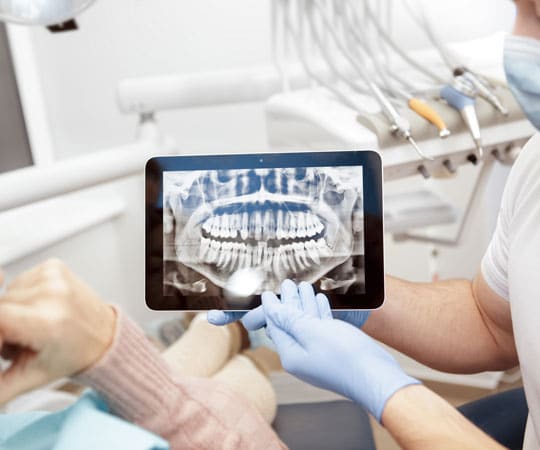
Tips to take care Teeth in Middle Age
We depend on our teeth for more than we tend to realize. When you socialize, you rely on a bright and full smile when opening your mouth and talking to others. While eating, teeth contribute to your ability to chew food effectively. This is important because this is the start of the entire digestive process. Age is often one of the main factors associated with the risks of gum disease and tooth-related problems. Does this mean you have to accept the fact that teeth will eventually wear out and become problematic as you age? The short answer is no, as long as you can keep your teeth and gums healthy.
In this post, we share a few tips to help you take care of your oral health. We also look at what to expect as you age.
Your Two Sets Of Teeth
The human body is only capable of producing two sets of teeth. The first set comes out at a very young age. This set of teeth is generally referred to as the baby teeth. The first tooth tends to come out between the age of six and 12 months. Following this event, more teeth start to surface in the upcoming months.
A few years later, however, a permanent set of teeth start to emerge. In this case, baby teeth are lost to make way for permanent teeth.
You only have a single set of permanent teeth. If you lose a tooth, a new one will not come out or grow in its place. Instead, you will be left with a gap between two teeth – but, thanks to several advancements in the dental industry, many options are available to fill such a gap.
Common Oral Health Problems In Middle Age Individuals
A few oral hygiene problems seem to be more common among middle-aged adults compared to other conditions. Adults should ensure they understand which conditions are more common at their age, as the right preventative measures can then be taken.
Some of the most reported dental issues among middle-aged adults include:
- Gum Disease
- Periodontal disease
- Tooth Loss
- Dry Mouth
While these are not the only dental problems experienced by the general population, they seem to be the more common. When these diseases are not treated through dental treatments, it could lead to complications. A dentist helps to diagnose and treat gum disease, tooth decay, and other problems that can result in serious complications left untreated.
What Happens To Your Teeth As You Age?
Many adjustments in the body happen with age. By middle age, many people do find that they start to really feel some of these changes. The mouth is one area that tends to experience a few changes, knowing what to expect helps a person better prepare for such events. Additionally, by understanding what changes occur, you can also implement appropriate methods to avoid serious complications in the long term.
Smaller Nerves
One of the major factors to consider is the fact that nerves in teeth become smaller with age. This happens naturally, and there isn’t much that can be done about the shrinkage of nerves. When the nerves are smaller, you are not as sensitive to the presence of cavities. This does not mean cavities will no longer develop, however. It just means that you won’t be able to identify the presence of cavities at an early stage. This can lead to additional complications. When you are unaware of cavities, they continue to develop, as no treatment is provided. The cavities become bigger, weakening the structure of teeth. In turn, this makes you more likely to experience cracks, infections, and similar complications. The effect makes the process of having healthy teeth harder for the average person.
The Wearing Of Teeth
In addition to nerves becoming smaller, it is also important to note that wearing may happen over time. Many people grind their teeth – and this happens can cause teeth to wear down even faster. The wearing generally happens because a person is using their teeth frequently. Chewing food and biting onto hard things, such as candy, contributes to the wearing of teeth.
When teeth wear, they may lack the strength they once had. This can increase your risk of experiencing a chip in a tooth or broken teeth. The effect can also cause nerves to become exposed, and, in turn, this may lead to pain and other symptoms.
Shifting Of Teeth Over Time
Shifting of teeth often happens too. In your younger years, you enjoy a straight set of teeth. As you grow closer to middle age, you start to notice misalignments in your teeth. This occurs due to the shifting that happens.
Keep Your Teeth Healthy In Middle Age
We have taken a look at some of the more commonly reported dental problems among the population. The question now remains how do you take better care of your teeth as a middle-aged individual? Fortunately, there are proven methods that can be helpful. Consider all of your options while also considering existing dental issues. This helps you identify any treatments that you may need from a dentist at the moment. You also get an opportunity to determine how you can take better care of your teeth and gum tissue.
Oral Hygiene Habits
How you care for your teeth forms an important part of how long they will last. Dental care should include two essential factors. This includes dental care services provided by a dentist. Additionally, there are several strategies that you should do at home too. Forming a dental care habit is definitely the ideal option here. This would allow you to take better care of your dental health.
Start by ensuring brushing and flossing becomes part of your daily routine. Brush and floss in the morning, as well as at night. This habit helps keep your teeth clean and ensures any particles left in your mouth can be effectively removed. The use of a mouth rinse can also be helpful. Some rinses come with antibacterial properties. This helps to prevent bacteria from building up on your gum tissue.
Correcting Shifts And Crooked Teeth
Crooked teeth might only impact your self-confidence at first, but you could end up with bigger problems over time without taking care of these problems. Thus, consider seeing a dentist and discussing your options if you find that your teeth are shifting a lot. There are several dental solutions for shifting. The use of braces tends to be one of the more efficient options. Take note that braces are not only for teens – as many adults get them too. Brushing and flossing should continue to be important, even if you are required to wear braces for a few months.
Frequent Checkups
Visiting the dentist frequently is also important. Professional dental care helps to keep your teeth and gums healthy. Dentists are also able to provide you with preventative care services. In such a case, the dentist could assist in lowering your risk of gum disease, tooth decay, and other common dental problems.
A dentist can also check for signs of disease during these checkups. When oral health conditions are detected early on, it is usually easier to treat the disease. The treatment provided by the dentist may also be less invasive in this scenario and turn out to be more successful – particularly compared to only obtaining an inspection from a dentist once the condition has progressed significantly.
What To Avoid to take care of your teeth
Brushing and flossing, correcting shifts, and seeing the dentist frequently – should be the foundation of your strategy. Additionally, there are a few extra things to consider. This includes a list of a few things to avoid – such as certain bad habits or foods.
When it comes to improving the health of your mouth, then here are a few things you should try to avoid:
- Try to stop smoking if this is a habit you currently practice. Do not start using smokeless tobacco products as an alternative. Both of these product types have adverse effects on your oral health.
- According to NCBI, avoid biting your nails, as this wears your teeth and can cause several other complications. Germs from your nails can also accumulate on your gums.
- Limit your intake of sugary beverages. These beverages contribute to tooth decay. A lot of these beverages can have a serious impact on oral health.
- Coffee and tea have benefits for your health, but drinking too much of these can stain your teeth. If you add a lot of sugar to these beverages, be careful, as this could further contribute to tooth decay.
- Never use your mouth to open up caps or lids; it can cause a tooth to snap in half instantly.
Frequently Asked Questions
At what age do adults start losing teeth?
It comes down to how healthy the person’s teeth and gums are. It is not a guarantee that you will lose teeth when you reach a certain age, as strategies can keep your teeth healthy.
There are several fixes available for people who have teeth that are worn down. The specific fixes depend on several factors. A crown is definitely one of the more common options that people tend to opt for. Some people would instead opt for a procedure like dental bonding. In addition to these options, veneers are also something you can consider.
How can I whiten my teeth at 50?
There are many whitening options available to patients today, but professional procedures should be preferred. While it may be tempting to buy a whitening kit at a local store, these often come with unproven ingredients that could even result in side effects. Dentists are skilled in assessing your current oral health condition – and can then make appropriate recommendations. This may include professional cleaning, as well as polishing of your teeth.
The wearing of teeth is generally considered one of the biggest problems among older individuals. Even people who consider themselves middle-aged may find that wearing their teeth becomes an issue. This wearing can result in some teeth becoming shorter than others – thus creating misalignment in your bite. Some factors can cause this wearing process to happen faster. Teeth grinding is one important example to consider.
Many people do experience a shifting of their teeth. This shifting often becomes more noticeable in middle age and may continue to progress as the person ages further. When teeth shift, then it can cause complications. In many cases, people find that teeth are no longer as straight as they always were. The crookening of teeth can cause difficulty chewing food effectively. It can also result in problems with your confidence, especially while participating in social events.
How can I stop my teeth from aging?
The entire body goes through numerous changes as it ages. Over time, teeth also start to wear. While it is impossible to stop the aging process completely, many strategies can help delay the rate at which parts of the body age. Taking proper care of your teeth and gums would be the best method for ensuring teeth remains healthy – even into your senior years.
Smoking does have a significant impact on oral health. People who smoke are at a much greater risk of developing gum disease. Periodontal disease is also significantly more common among smokers. It should be noted that these risks are not only associated with smoking. The use of chewing tobacco and similar products causes a similar risk. Smokeless tobacco irritates the gums and can lead to gums becoming loose around the patient’s teeth.

